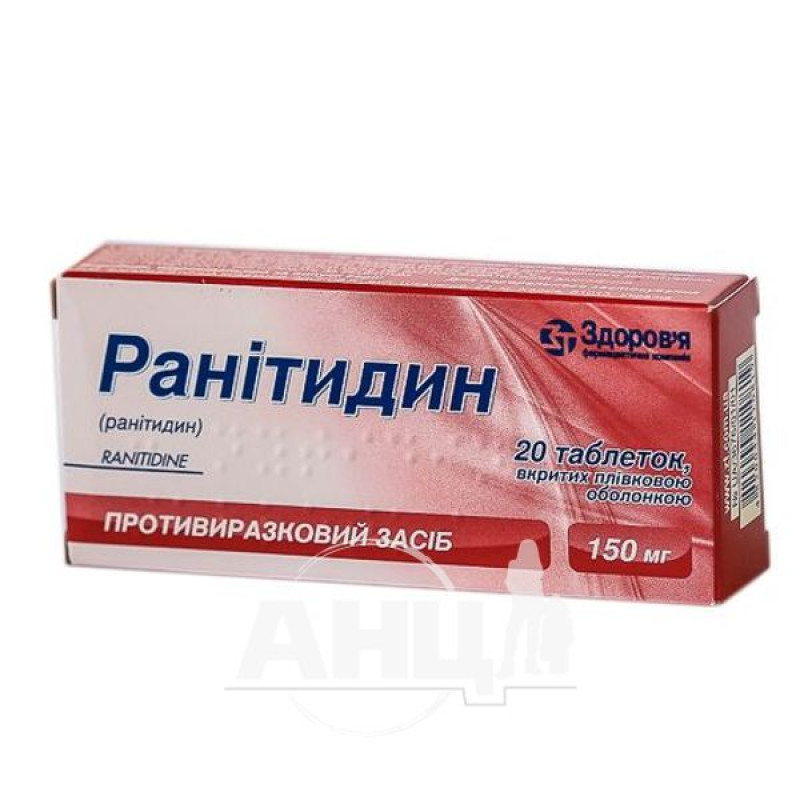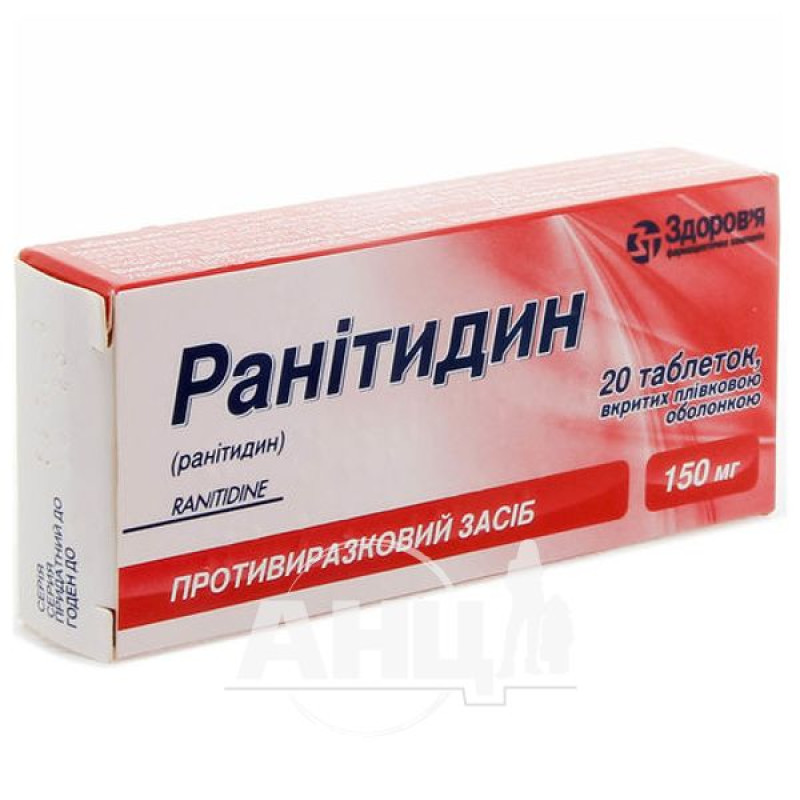Ranitidine film-coated tablets 150 mg No. 20

Composition
One Ranitidine tablet contains 150 mg of Ranitidine. Celactose (a mixture of lactose, monohydrate and cellulose powder in a ratio of 75:25), croscarmellose sodium, colloidal anhydrous silica, magnesium stearate, hypromellose, titanium dioxide and tropeolin 0 are used as auxiliary substances.
Release form
Ranitidine is a film-coated tablet. They have a shade from yellow to orange-yellow and have a specific smell. Two layers are visible in the section.
Pharmacological properties
Pharmacodynamics. Ranitidine acts as an antiulcer agent and an antagonist of H2-histamine receptors.
The mechanism of action of Ranitidine consists in the competitive inhibition of H2-histamine receptors of the membranes of the parietal cells of the gastric mucosa. This leads to a decrease in both basal and stimulated secretion of hydrochloric acid, as well as to a reduction in the volume of gastric juice resulting from irritation of baroreceptors (caused by distension of the stomach), food intake, as well as under the influence of hormones and biogenic stimulants (such as gastrin, histamine, pentagastrin, caffeine). Ranitidine helps to reduce the amount of hydrochloric acid in gastric juice, but does not affect gastrin concentration in blood plasma and mucus production. It has a long-lasting effect.
Ranitidine does not affect the cytochrome P450 enzyme system in the liver.
Pharmacokinetics. After taking Ranitidine in the form of tablets, it is quickly absorbed in the gastrointestinal tract. Bioavailability is about 50%. The high blood concentration (Cmax) is reached after 2–3 hours and is 478 ng/ml. Ranitidine is partially metabolized in the liver, forming the main metabolite - N-oxide (4% of the total dose). The process of S-oxidation and demethylation also occurs.
Indications
- Stomach and duodenal ulcer not associated with Helicobacter pylori (in the period of exacerbation), including ulcer associated with the use of nonsteroidal anti-inflammatory drugs (NSAIDs);
- functional dyspepsia;
- Chronic gastritis with increased acid-forming function of the stomach in the stage of exacerbation;
- Ulcer;
- Gastroesophageal reflux disease (for relief of symptoms) or reflux esophagitis.
Contraindications
High sensitivity to Ranitidine and the second component of the drug, malignant diseases of the stomach, presence of cirrhosis of the liver with portosystemic encephalopathy in the anamnesis, liver failure, severe renal failure (creatinine clearance less than 30 ml/min).
Application
It is recommended to appoint Ranitidine to adults and persons older than 12 years. The drug should be taken orally, without chewing, with a small amount of water, regardless of food.
Adverse reactions
When using the drug Ranitidine, various reactions of the body may occur:
- From the side of the blood system: leukopenia, reversible thrombocytopenia, agranulocytosis or pancytopenia, sometimes with bone marrow hypoplasia or aplasia, neutropenia, immune hemolytic and aplastic anemia (usually temporary) are possible.
- On the part of the immune system: hypersensitivity reactions are possible, including urticaria, angioedema, fever, anaphylactic shock, bronchospasm, exudative erythema multiforme, exfoliative dermatitis, Stevens-Johnson syndrome, Lyell's syndrome, hyperthermia.
- On the part of the psyche: increased fatigue, reversible confusion of consciousness, drowsiness, agitation, insomnia, emotional lability, restlessness, anxiety, depression, nervousness, hallucinations, tinnitus, irritability, disorientation are possible. These manifestations are observed mainly in seriously ill or elderly patients.
- On the part of the nervous system: headaches, dizziness and reverse spontaneous motor disorders are possible.
- On the part of the organs of vision: blurred vision, impaired accommodation are possible.
- From the side of the cardiovascular system: a decrease in blood pressure, bradycardia, tachycardia, asystole, atrioventricular block, vasculitis, chest pain, arrhythmia, extrasystole are possible.
- On the part of the digestive tract, dry mouth, nausea, vomiting, constipation, diarrhea, abdominal pain, flatulence, acute pancreatitis, decreased appetite are possible.
- On the part of the hepatobiliary system: transient and reversible changes in liver function indicators are possible; hepatocellular, cholestatic or mixed hepatitis with or without jaundice (usually temporary).
- From the side of the skin and subcutaneous tissue: hyperemia, itching, rash, erythema multiforme, alopecia, dry skin are possible.
- From the musculoskeletal system, arthralgia and myalgia are possible.
- On the part of the urinary system, kidney function disorders, acute interstitial nephritis are possible.
- On the part of the reproductive system: hyperprolactinemia, galactorrhea, gynecomastia, amenorrhea, decreased potency (reversible) and/or libido are possible.
Overdose
An overdose of Ranitidine tablets may increase side effects.
Treatment: if necessary, appropriate symptomatic and supportive therapy should be carried out. Ranitidine can be removed from blood serum by hemodialysis.
Storage conditions
Store Ranitidine in the original packaging at a temperature not higher than 25 °C. Keep out of the reach of children.
There are no reviews for this product.
There are no reviews for this product, be the first to leave your review.
No questions about this product, be the first and ask your question.






